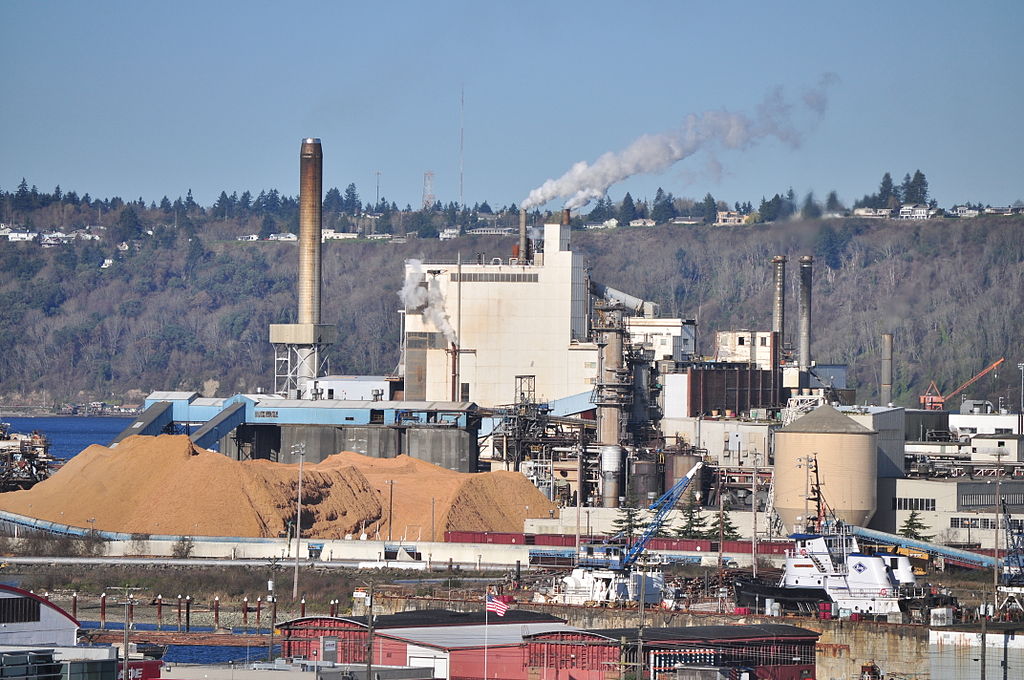
By: Hannah Lee
The ‘Aroma of Tacoma’ is – or was – the infamous stink that surrounds our little city. Tacoma was once one of the biggest exporters of lumber in the world, and the stink has been documented to start when the industrial infrastructure in town was built. There are many theories attributed to this stinky phenomenon that persists to this day.
After 94 years of operation and stories of it being the leading cause of the ‘Tacoma aroma,’ the Tacoma paper mill closed on September 30, 2023. In a statement released on August 1, officials from WestRock, the company that owns the plant, stated, “The combination of high operating costs and the need for significant capital investment were the determining factors in the decision to cease operations at the mill.”
According to Mark Heald’s article on the Sporcle Blog, the ‘Tacoma Aroma’ is concentrated in the Tacoma Tide Flats, which were previously industrialized zones, and describes it as a “sulfuric, rotten egg kind of smell”.
Heald believes that the ‘Tacoma Aroma’ is a combination of the sediment around Commencement Bay and the past 100 years of industrial development, which is one of the many leading theories. Tacoma’s port and railroad helped with the “development of various pulp pills, rendering plants, chemical factories, petroleum processors, and aluminum smelters,” according to Heald. He writes that Tacoma’s reputation for smelling bad has been around since the 1940s, thanks to the city’s many industries.
The smell has lessened significantly since then thanks to more environmentally friendly manufacturing processes, but the aroma still persists.
Another leading theory about what causes the smell is that sulfur was released into Commencement Bay by Simpson Tacoma Kraft paper mill, the rendering plant, and the US Oil Refinery, both located nearby. The theory that the paper mill is responsible for the aroma seems to be the most popular among locals through online discussion about the ‘Tacoma Aroma’.
The paper mill has been in Tacoma since 1929 and was part of the city’s logging industry. The process of breaking down wood into paper pulp results in odors wafting through the city, which could be part of the ‘Tacoma Aroma’.
In a 1998 article in the New York Times, mill officials confirmed that they did use wood chips filled with chemicals to produce paper foam containers. It is difficult to confirm if these chemicals contributed to the ‘Tacoma Aroma’ but it is very likely.
A 1985 article from the Associated Press spoke about the harm that these chemicals could cause. Dr. James Billingsley, a lung specialist, confirmed that the airborne chemicals emitted by the paper mill decreased lung function.
Paper mill officials did confirm that they spent thirty-eight million dollars on updating their facilities. This significantly reduced the mill’s air pollution. This was confirmed by state and federal officials. The current ‘aroma’ does not pose a health risk to anyone.
The closure of the mill could lessen the odor, but that is not the only impact that it has on the local community. Northwest Public Broadcasting spoke with Scott Dewhirst, the Tacoma Water Superintendent. He revealed that the paper mill used about 16 million gallons a day and made up 30% of its revenue per year. There were also concerns about rising rate increases to offset the income lost, and infrastructure problems caused by water sitting in pipes for too long.
Another impact of the mill closure is the impact on employment. 400 people will no longer be employed. WestRock officials say that all of their employees have received severance pay and outplacement assistance in accordance with their company and labor union policies.
Tacoma was originally an industrial logging town, but with the closure of the paper mill, our little city could be shifting away from that identity. But with that shift, it means cleaner air and a healthier environment for everyone.
